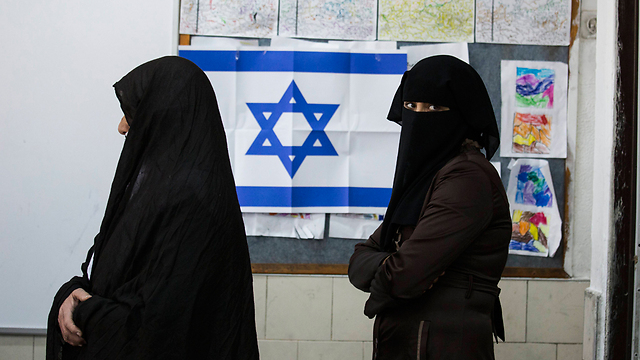
In recent years, I have often been under the impression that Israel’s Arabs citizens have gotten caught in a crossfire between politicians from the right side of the map, who are competing over “who will harm the Arabs more.” The Nationality Bill, which was approved Sunday by the Ministerial Committee for Legislation, is a direct continuation of the Muezzin Bill, which has already passed a preliminary Knesset reading following direct pressure from the prime minister, and of a series of initiatives aimed at appealing to voters by harming Israel’s Arab citizens.
The Nationality Bill has two meanings—a declarative meaning and a practical meaning. On the declarative level, it’s about pushing the Arab minority to the margins of society. Simply telling us that Israel is first and foremost an ethnocracy, a state whose top priority is nationality rather than democratic values, which is why we are considered second-class citizens.
On the practical level, the law cancels the status of Arabic as an official language in the State of Israel, enforces and expands the “admission committees law” and, most importantly, legally enforces Judaism over democracy, which will have a lot of ramifications on future rulings on discrimination issues.

If there were a real problem in the state’s Jewish identity, the motives for the law may have been seen as relevant. If the anthem and the flag included no Jewish characteristics, if Shabbat was not the official day of rest, and if a series of Basic Laws enforcing democracy in Israel—like a Basic Law on freedom of speech—overshadowed the state’s Jewishness. A foreign visitor would have likely thought that the Arab minority had gotten so strong, was serving in key positions throughout the country, and that the legislation was so liberal, that in order to keep just a little of the state’s Jewish characteristics there was a need to enact a law that would defend the Jewish majority from a takeover by the Arab minority.
I am often asked what would really make us, Israel’s Arab citizens, feel “at home” in Israel. Sometimes it comes in the form of an accusing question: “Why aren’t you loyal to the state?” Such laws conceal the real answer, and the next time the Jewish public asks itself why we don’t feel part of the state, it should consider how we feel every time we are turned into a stationary target for politicians who wish to prove their patriotism at our expense, without any essential need.
In a slightly symbolic manner, the Ministerial Committee for Legislation approved the Nationality Bill on Herzl Day, a day commemorating the visionary of the Jewish state, who stressed in his writings the importance of fair treatment of the minority and the value of equality. In “The Jewish State,” for example, he wrote: “Every man will be as free and undisturbed in his faith or his disbelief as he is in his nationality. And if it should occur that men of other creeds and different nationalities come to live amongst us, we should accord them honorable protection and equality before the law.” So what would Herzl think about the Nationality Bill?
Israel’s leadership appears to have diverted from Herzl’s path. Instead of striving to create equality and a common ground, it is doing everything in its power to incite and divide, thinking it will gain a few more votes. But it is precisely these kinds of laws that can and should lead to an opposite outcome, and the majority of the public understands their proposers' transparent goal. The important mission of Jews and Arabs from all ends of the political spectrum, who don’t wish to be part of the hatred campaign, is therefore to propose legislation that reflects equality, to get our children to study together and apart about each other’s culture in school, to meet and discuss the differences of opinion between us out of respect and, of course, to oppose divisive and discriminatory initiatives. Our mission is that every such law will lead to both a practical and electoral boomerang effect.
Nasreen Hadad Haj-Yahya is co-director of the Arab-Jewish Relations Program at the Israel Democracy Institute.
















